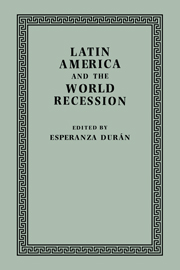Book contents
- Frontmatter
- Contents
- Contributors
- Preface
- 1 The Political Setting: ‘Business as Usual’ or a New Departure?
- Part One The Global Perspective
- Part Two Case Studies
- 5 Brazil's Foreign Debt: The National Debate
- 6 Mexico: Learning to Live with the Crisis
- 7 The Rise and Fall of the Chilean Economic Miracle
- 8 Venezuela: The Oil Boom and the Debt Crisis
- 9 World Recession and Central American Depression: Lessons from the 1930s for the 1980s
- 10 Conclusion
- Index
10 - Conclusion
Published online by Cambridge University Press: 05 February 2012
- Frontmatter
- Contents
- Contributors
- Preface
- 1 The Political Setting: ‘Business as Usual’ or a New Departure?
- Part One The Global Perspective
- Part Two Case Studies
- 5 Brazil's Foreign Debt: The National Debate
- 6 Mexico: Learning to Live with the Crisis
- 7 The Rise and Fall of the Chilean Economic Miracle
- 8 Venezuela: The Oil Boom and the Debt Crisis
- 9 World Recession and Central American Depression: Lessons from the 1930s for the 1980s
- 10 Conclusion
- Index
Summary
It has been two years since the Latin American debt crisis erupted. Yet the prospects for the ability of the Latin American countries to pay interest on the debt, not to mention the repayment of the principal, look bleaker than when the crisis first started. There is a growing realization amongst debtors and creditors alike that what they face is not just a short-term liquidity problem but a ‘structural imbalance’. This could be partly attributed to the outdated models of economic development that have prevailed in many debtor countries, but has been aggravated by the evolution of the international economic and financial system.
The world recession, which was the external factor contributing to the build-up of the crisis, has left a trail of negative consequences – high and rising interest rates, a decline in commodity prices, a wave of protectionism in the developed countries, to mention only the most important – which will hinder the capacity of the debtor countries to recover. Even if the debtors could check their course by efficient management of the domestic system of production and proceed along a healthy path of realistic exchange and interest rates, the constraints imposed on them by the external economic environment would be insurmountable.
The debt problem of the Third World in general, and Latin America in particular, has outgrown its own immediate limits and become one of global concern. Its economic, financial and consequent political repercussions have transcended the sphere of debtors and directly involved lenders (creditor banks and international financial institutions), becoming increasingly important to the governments of the industrialized world.
- Type
- Chapter
- Information
- Latin America and the World Recession , pp. 152 - 156Publisher: Cambridge University PressPrint publication year: 1985



